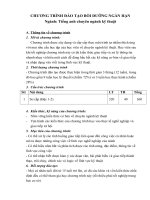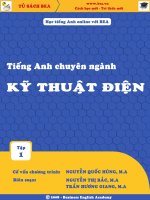Đề thi Tiếng anh chuyên ngành Kỹ thuật y học ĐH Y Dược Huế 20152016
Bạn đang xem bản rút gọn của tài liệu. Xem và tải ngay bản đầy đủ của tài liệu tại đây (29.66 KB, 12 trang )
SECOND SEMESER
EXAMINATION
SUBJECT: MEDICAL
ENGLISH
Time : 60 minutes
FORM A
SECTION 1 : VOCABULARY AND STRUCTURE
Choose the best answer.
1. Blood samples for testing can............either from
a vein or from an artery.
A. be take B. take
C. be taking D. be
taken
2. The kidneys remove waste material, minerals,
fluids, and other materials from the blood to be
passed in the urine.
A. consist of
B. contain C. take out D.
measure
3. If only a few………. of blood are needed, it is
enough to make a small prick in the tip of the
finger and squeeze the blood out.
A. drops B. play
C. litter D. bottles
4. The site of the injection is then cleaned……..
spirit and then a needle is put into the vein.
A. by
B. with
C. in
D. for
5. Some people are very ………. To needles and the
sight of their own blood and may feed faint when
a blood sample is taken.
A. sensitive
B. similar C. serious D.
comfortable
6. The needle will be attached…….. a syringe
where the plunger is pulled back to create low
pressure.
A. at
B. on
C. to
D.in
7. About 7 to 8 percent of your total body weight
is………… .
A. bone B. water C. Blood D. plasma
8. Low numbers of platelets can make a
person………… to bleeding.
A. sensitive
B. allergic C. vulnerable
D. valuable
9. Red cells contain a special protein…..
hemoglobin.
A. called B. is called
C. calls D.
calling
10. Hepatitis is the inflammation of the …………. .
A. kidneys B. lungs C. livers D. pancreas
11. When you drink a lot of fluid, your kidneys
make urine with a high amount of water in it,
which has a ………. Specific gravity .
A. low
B. high
C. moderate D. slow
12. The other major type of white blood cell is
a(n)…………… .
A. erythrocyte
B. platelet C.
lymphocyte D. plasma
13. The esophagus is a tube …….. from the
pharynx to the stomach.
A. which extends
B. extending C. extends
D. A & B are correct
14. When fat……… down for energy, the body
makes substances called ketones.
A. breaks B. is broke C. is broken D. broken
15. Glucose is the type of sugar………… in blood.
A. found B. find
C.is found D.finding
16. Doctors also add stains to the blood smear
……….. the blood of bacteria .
A. to testing
B. to test C. so that
testing
D. so that to test
17. Normally, there is very little or ……… glucose
in urine.
18. When your body needs……. iron than it is a
available, you can become anemic.
A. more B. much C. less
D. fewer
19. WBCs is the urine may mean a UTL exists.
A. is present
B. is absent C.
disappears D. lives
20. The human body ……… a head, neck, torso,
tow arms and two legs.
A. consist of
B. consists off C.
consists of
D. is consisting of
21. Heart is the major organ of the ……..system.
A. respiratory
B. circulatory C.
urinary
D. digestive
22. Inside the head is the brain ………. is
responsible for thinking.
A. that
B. it
C. which D. what
23. The joint half way down the arm is called the
………. .
A. knee
B. elbow C. forearm
D. ankle
24. The bottom tip of the heart is known as
its………..
A. apex
B. base
C. aorta D. chamber
25. All blood vessels are ……….. a thin layer of
simple squamous epithelium known as the
endothelium .
A. lined with
B. lining with C. lined in
D. be lined with
26. Any child ……… looks malnourished should be
taken to the hearth station.
A. who
B. that
C. whom D. A & B are
correct
27. After ……. Oxygen, the blood leaves and is
carried to your heart.
A. absorption
B. absorbing C. being
absorbed
D. absorbed
28. the kidneys remove urea from the blood
through small tiltering units called………
A. neurons
B. renal tubules C.
muscle
D. nephrons
29. The ……… id a tube that connects the bladder
to the external genitalia for elimination of urine
from the body.
A. ureter B. urethra C. renal tubule
D.
return
30. An infection of the bladder is called ………
A. gastritis
B. hepatitis C. eystitis
D. dermatitis
SECTION 2 : TERMINOLOGY
Match a term in column A with its definition
in column B
A
31. plasma
32. artery
33. neutrophil
34. platelet
35. urine
36. stomach
37. vein
38. white blood cells
B
A. The first part of the
large intestine
B. The first part of the
small intestine
C. A blood vessel that
carried blood to the
heart
D. The most common
type of white blood cell
E. A liquid waste
product produced by
the kidneys
F. A blood vessel which
takes blood away from
the heart
G. Small fragments of
cells in the blood which
help the blood clotting
process
H. a sack-like organ of
the digestive system
39. duodenum
40. cecum
I. The cells protect the
body from injection
J. The liquid component
of blood which
transports blood cells
throughout the body
SECTION 3: READING COMPREHENSION
I. COLZE TEST: Choose the best word for
each sentence.
A. under B. play C. handling D. ossify
well
F. wear G. which H. on I. found J.
diagnosis
E.
Medical laboratory technicians………(41) an
important role in the prevention and ……….(42)
of diseases, such as cancer, diabetes and AIDS.
Medical lab technicians work……….(43) the
supervision of a physician, lab manager or
medical technologist and perform laboratory
tests specimens.
The tests that lab techs conduct……….(44)
doctors in verifying the causes of an illness
making medical decision and determining
treatment options. Some of the areas in ………….
(45) medical lab technicians may specialize
include microbiology, hematology, blood banking,
immunology, clinical chemistry, molecular
biology, cytotechnology.
Work Environment
Most medical lab technicians can be ……….(46)
working in hospitals, diagnostic laboratories and
physician offices. Other employment options for
medical lab technicians are available with blood
and organ banks, medical equipment sales
companies, research facilities, clinics, public
health organizations, as ………(47) as
pharmaceutical and reference laboratories.
Their workplaces are clean, sanitized and well lit.
They must ………(48) protective clothing,
including lab coats, masks, goggles and gloves,
when ………(49) equipment or specimens. They
can work odd shifts throughout the day and be
………...(50) call, in case of emergency.
II. Read the following passage and say if the
sentences below are true or false.
Blood Disorders
When something is wrong with your blood, it can
affect your total health. That is why it is
important for you to know about some of the
common blood disorders that may affect you.
People may be affected by many different type of
blood conditions and blood cancers clots, and
blood cancers such as leukemia, lymphoma.
Talking to your doctors is the first step to take if
you believe you may have a blood condition. If
you are diagnosed with a blood disorder, your
doctor may refer you to a hematologist.
What is Hematology?
Hematology is the study of blood in health and
disease. It includes problems with the red blood
cells, white bold cells, platelets, blood vessels,
bone marrow, lymph nodes, and the proteins
involved in bleeding and clotting (hemostasis and
thrombosis) A hematologist is a medical doctor
who applies this specialize knowledge to treat
patients with blood conditions.
51. Your total health can be affected when there
is something wrong with your blood.
52. Anemia is not a common blood disorder.
53. If you are diagnosed with a blood disorder,
your doctor may refer you to a doctor who
specializes in hematology.
54. The study of blood in health and disease is
called hematology.
55. Treating patients with blood conditions is not
the responsibility of a hematologist.
SECTION4: WRITING
Complete the following sentences in such a
way that they best keep the meaning of the
sentences printed above.
56. The stomach is a sack-like organ.
- The stomach
has……………………………………………………………............
.....................................................
57. Urethra is a tube connecting the bladder to
the external genitalia for eliminating urine from
the body.
- Urethra is a tube…………. to the external
genitalia for eliminating urine from the body.
58. The pancreas is involved in the secretion of
insulin .
- The pancreas
plays…………………………………………………………….
59. It is difficult to follow the doctor’s advice.
Following…………………………………………………………
…………
60. Who was this patient examined by?
Who…………………………………………………………………
…………
----------THE END----------









